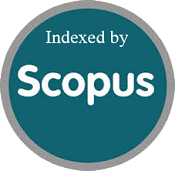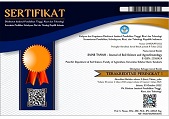Relationship model of land biophysical properties and their influence on Arabica coffee production in Bandung Regency, Indonesia by using the PCR method
Abstract
Keywords
Full Text:
PDFReferences
Abdi, H., & Williams, L. J. (2010). Principal component analysis. WIREs Computational Statistics, 2(4), 433-459. https://doi.org/10.1002/wics.101
Adekiya, A. O., Ejue, W. S., Olayanju, A., Dunsin, O., Aboyeji, C. M., Aremu, C., . . . Akinpelu, O. (2020). Different organic manure sources and NPK fertilizer on soil chemical properties, growth, yield and quality of okra. Scientific Reports, 10(1), 16083. https://doi.org/10.1038/s41598-020-73291-x
Alzwar, M., Akbar, N., & Bachri, S. (1992). Peta geologi lembar Garut dan Pameungpeuk, Jawa. Direktorat Geologi, Bandung, Indonesia.
BBSDLP. (2016). Atlas Peta Tanah Skala 1:50,000 Kabupaten Bandung, Provinsi Jawa Barat. Bogor, Indonesian Center for Agricultural Land Resources Research and Development.
Benevenute, P. A. N., Pereira, F. A. C., Barbosa, S. M., da Silva, R. F., Domingues, M. I. S., Marques Filho, A. C., . . . Silva, B. M. (2025). Deep soil tillage in the coffee planting furrow has long-lasting benefits for improving soil physical quality and enhancing plant vigor in dense soils. Soil and Tillage Research, 248, 106448. https://doi.org/10.1016/j.still.2025.106448
Brady, N. C., & Weil, R. R. (2000). Elements of the Nature and Properties of Soils (12th ed.). Prentice Hall. https://books.google.co.id/books?id=EaKcQgAACAAJ
Budiastuti, M. T. S., Purnomo, D., Hendro, H., Sudjianto, U., & Gunawan, B. (2020). Rehabilitation of critical land by Implementing complex agroforestry at the prioritized subwatersheds in the Muria Region. Sains Tanah Journal of Soil Science and Agroclimatology, 17(1), 8. https://doi.org/10.20961/stjssa.v17i1.37704
Clemente, J. M., Martinez, H. E. P., Alves, L. C., Finger, F. L., & Cecon, P. R. (2015). Effects of nitrogen and potassium on the chemical composition of coffee beans and on beverage quality. Acta Scientiarum. Agronomy, 37(3), 297-305. https://doi.org/10.4025/actasciagron.v37i3.19063
Climate Data. (2024). Climate: Asia. Retrieved June 1, 2024 from https://en.climate-data.org/asia/
Dias, K. G. d. L., Guimarães, P. T. G., do Carmo, D. L., Reis, T. H. P., & Lacerda, J. J. d. J. (2018). Alternative sources of potassium in coffee plants for better soil fertility, productivity, and beverage quality. Pesquisa Agropecuária Brasileira, 53(12), 1355-1362. https://doi.org/10.1590/S0100-204X2018001200008
Dias, K. G. d. L., Neto, A. E. F., Guimarães, P. T. G., Reis, T. H. P., & Oliveira, C. H. C. d. (2015). Coffee yield and phosphate nutrition provided to plants by various phosphorus sources and levels. Ciência e Agrotecnologia, 39(2), 110-120. https://doi.org/10.1590/S1413-70542015000200002
Ditjenbun. (2023). STATISTIK PERKEBUNAN JILID I 2022-2024 [STATISTICS OF ESTATE CROPS VOLUME I 2022-2024]. Directorate General of Estates, Ministry of Agriculture of Republic of Indonesia. https://ditjenbun.pertanian.go.id/buku-statistik-perkebunan-jilid-i-2022-2024/
Esmaeilzadeh, J., & Ahangar, A. G. (2014). Influence of soil organic matter content on soil physical, chemical and biological properties. International Journal of Plant, Animal and Environmental Sciences, 4(4), 244-252. https://www.fortunejournals.com/ijpaes/admin/php/uploads/732_pdf.pdf
Eviati, Sulaeman, Herawaty, L., Anggria, L., Usman, Tantika, H. E., . . . Wuningrum, P. (2023). Petunjuk Teknis Analisis Kimia Tanah, Tanaman, Air, dan Pupuk (3rd ed.). Testing Center for Soil and Fertilizer Instrument Standards, Ministry of Agriculture of the Republic of Indonesia. https://tanahpupuk.bsip.pertanian.go.id/berita/juknis-analisis-kimia-edisi-3-acuan-prosedur-analisis-tanah-tanaman-air-dan-pupuk
FAO. (2007). Land evaluation: towards a revised framework (LE_Rev). FOOD AND AGRICULTURE ORGANIZATION OF THE UNITED NATIONS. https://www.fao.org/land-water/land/land-governance/land-resources-planning-toolbox/category/details/fr/c/1029521/
FAO. (2024). FAOSTAT. Statistical database. Food and Agriculture Organization of the United Nations. Retrieved June 27, 2024 from https://www.fao.org/faostat/en/#data/QCL
Getachew, M., Boeckx, P., Verheyen, K., Tolassa, K., Tack, A. J. M., Hylander, K., . . . De Frenne, P. (2023). Within and among farm variability of coffee quality of smallholders in southwest Ethiopia. Agroforestry Systems, 97(5), 883-905. https://doi.org/10.1007/s10457-023-00833-3
Gillespie, C. J., Antonangelo, J. A., & Zhang, H. (2021). The Response of Soil pH and Exchangeable Al to Alum and Lime Amendments. Agriculture, 11(6), 547. https://doi.org/10.3390/agriculture11060547
He, Z., He, S., Zheng, Z., Yi, H., Qu, S., & Liu, X. (2025). Change in soil organic carbon after slope cropland changed into terrace in southwest China. CATENA, 248, 108580. https://doi.org/10.1016/j.catena.2024.108580
HuaGang, H., Wang, D., SiQi, M., JianJun, P., & ZhaoFu, L. (2023). Hyperspectral Prediction of Organic Matter in Soils of Different Salinity Levels in the Yellow River Delta. Scientia Agricultura Sinica, 56(10), 1905-1919. https://doi.org/10.3864/j.issn.0578-1752.2023.10.008
Jolliffe, I. T., & Cadima, J. (2016). Principal component analysis: a review and recent developments. Philosophical Transactions of the Royal Society A: Mathematical, Physical and Engineering Sciences, 374(2065), 20150202. https://doi.org/10.1098/rsta.2015.0202
Liliane, T. N., & Charles, M. S. (2020). Factors Affecting Yield of Crops. In D. Amanullah (Ed.), Agronomy - Climate Change & Food Security. IntechOpen. https://doi.org/10.5772/intechopen.90672
Muktamar, Z., Lifia, L., & Adiprasetyo, T. (2020). Phosphorus availability as affected by the application of organic amendments in Ultisols. Sains Tanah Journal of Soil Science and Agroclimatology, 17(1), 7. https://doi.org/10.20961/stjssa.v17i1.41284
Mulyono, A., Suriadikusumah, A., Harriyanto, R., & Djuwansah, M. R. (2019). Soil Quality under Agroforestry Trees Pattern in Upper Citarum Watershed, Indonesia. Journal of Ecological Engineering, 20(1), 203-213. https://doi.org/10.12911/22998993/93942
Pivková, I., Kukla, J., Hnilička, F., Hniličková, H., Krupová, D., & Kuklová, M. (2024). Relationship of selected properties of Cambisols to altitude and forest ecosystems of four vegetation grades. Heliyon, 10(10), e31153. https://doi.org/10.1016/j.heliyon.2024.e31153
Pusdatin. (2023). Analisis Kinerja Perdagangan Kopi. Center for Agricultural Data and Information Systems, Secretariat General, Ministry of Agriculture of the Republic of Indonesia.
Resende, L. S., Botrel, É. P., Pozza, E. A., Roteli, K. d. C., de Souza Andrade, O. C., & Pereira, R. C. M. (2022). Effect of soil moisture, organic matter and fertilizer application on brown eye spot disease in coffee plantations. European Journal of Plant Pathology, 163(2), 351-367. https://doi.org/10.1007/s10658-022-02481-2
Rubinfeld, D. L. (2011). Reference guide on multiple regression. In Reference manual on scientific evidence. The National Academies Press. https://doi.org/10.17226/13163
Sappe, N. J., Baja, S., Neswati, R., & Rukmana, D. (2022). Land suitability assessment for agricultural crops in Enrekang, Indonesia: combination of principal component analysis and fuzzy methods. Sains Tanah Journal of Soil Science and Agroclimatology, 19(2), 15. https://doi.org/10.20961/stjssa.v19i2.61973
Shaaban, M., Wang, X., Song, P., Hu, R., & Wu, Y. (2024). Impact of Dolomite Liming on Ammonia-Oxidizing Microbial Populations and Soil Biochemistry in Acidic Rice Paddy Soils. Agronomy, 14(9), 2070. https://doi.org/10.3390/agronomy14092070
Siahaan, A. S. A., Hanum, C., & Ernawita. (2022). THE CORRELATION OF ELEVATION, SOIL CHEMICAL PROPERTIES AND YIELD OF COFFEE ARABICA IN SHADED CONDITIONS. IRAQI JOURNAL OF AGRICULTURAL SCIENCES, 53(6), 1407- 1417. https://doi.org/10.36103/ijas.v53i6.1656
Silitonga, P. H. (1973). Peta geologi lembar Bandung, Djawa. Direktorat Geologi, Bandung.
Soil Survey Staff. (2014). Kellogg Soil Survey Laboratory Methods Manual. Soil Survey Investigations Report No. 42, Version 5.0 (R. Burt & Soil Survey Staff, Eds.). U.S. Department of Agriculture, Natural Resources Conservation Service. https://www.isric.org/sites/default/files/KelloggSSL_MethodsManual_R42V5_2014.pdf
Supriyadi, E. (2017). Perbandingan metode partial least square (PLS) dan principal component regression (PCR) untuk mengatasi multikolinearitas pada model regresi linear berganda. Unnes Journal of Mathematics, 6(2), 117-128.
Tan, K. H. (2010). Principles of soil chemistry. CRC press. https://doi.org/10.1201/9781439894606
Thao, N. T. T., Khoi, D. N., Denis, A., Viet, L. V., Wellens, J., & Tychon, B. (2022). Early Prediction of Coffee Yield in the Central Highlands of Vietnam Using a Statistical Approach and Satellite Remote Sensing Vegetation Biophysical Variables. Remote Sensing, 14(13), 2975. https://doi.org/10.3390/rs14132975
Worku, M., Astatkie, T., & Boeckx, P. (2022). Effect of growing conditions and postharvest processing on arabica coffee bean physical quality features and defects. Heliyon, 8(4), e09201. https://doi.org/10.1016/j.heliyon.2022.e09201
Worku, M., de Meulenaer, B., Duchateau, L., & Boeckx, P. (2018). Effect of altitude on biochemical composition and quality of green arabica coffee beans can be affected by shade and postharvest processing method. Food Research International, 105, 278-285. https://doi.org/10.1016/j.foodres.2017.11.016
Yadessa, A., Burkhardt, J., Bekele, E., Hundera, K., & Goldbach, H. (2020). The major factors influencing coffee quality in Ethiopia: the case of wild Arabica coffee (Coffea arabica L.) from its natural habitat of southwest and southeast afromontane rainforests. African Journal of Plant Science, 14(6), 213-230. https://doi.org/10.5897/AJPS2020.1976
Yao, J., E, S., Yuan, J., Shi, X., & Che, Z. (2020). Effects of different organic matters on crop yields, soil quality and heavy metal content in irrigated desert soil. Chinese Journal of Eco-Agriculture, 28(6), 813-825. https://doi.org/10.13930/j.cnki.cjea.190850
Refbacks
- There are currently no refbacks.











.png)





